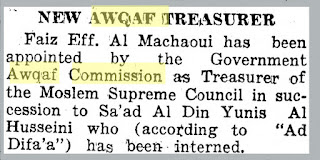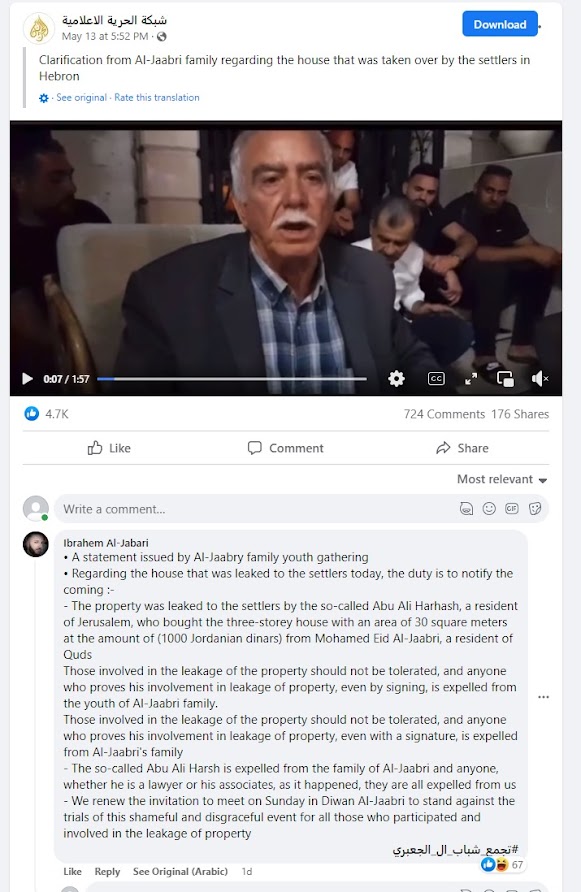The Nakba continues
It is indeed ironic that Arabs within Israel would see today as a catastrophe as well. Arabs in Israel need only survey the state of things in the nations that surround them to see how well they have done, how much they have benefited for being Israelis.Ben-Dror Yemini: Nakba was result of Palestinians backing Nazis during WWII
Is their situation ideal? Hardly. There is room for improvement, and assuming Arabs’ collegial interest in being part of the ongoing saga of Israel, there is a growing desire among Jews to integrate them into the warp and woof of Israeli society.
As it is, Arabs enjoy full civil and religious rights. They have extensive access to the best education and the most respected careers. They enjoy untrammeled access to Jewish towns and cities without offering reciprocal accessibility to Jews in their own villages.
If being an Arab in Israel is a catastrophe, one is hard pressed to imagine what a success would look like.
The sad reality is that quality of life – a good one in the case of Israeli Arabs and a poor one in the case of Palestinian Arabs – does not trump ideological considerations. Those Israeli Arabs who ignore the blessings of their Israeli citizenship while actively hoping for its demise define ingratitude.
The Palestinian Arabs who refuse to demand better conditions in their host countries are willing participants in a futile endeavor.
The common thread linking all of the various Nakba sensibilities is the simple refusal to accept that there is and will continue to be a State of Israel. This refusal makes it nigh unto impossible to have any sympathy for the self-inflicted wound of the continuing Nakba.
At the end of the day, people have the wherewithal to embrace reality and to move on with their lives. Woe to those who willingly refuse to do so.
The question remains, however, does the fact that thousands of Palestinian Arabs enlisted to the British Army proves that only a tiny minority of Palestinian backed the Nazis? Israeli researcher and author Yoni Rainey claims it doesn't.When Arabs Became Palestinians
In his books - "Closed Case" and "The Hidden Side of Nazism and the Holocaust" - he claims that about 9,000 Palestinian and Jordanian Arabs did enlist to the British Army during the war (in comparison with about 27,000 Jews). But, from the moment it became evident the Germans may pass through Egypt and reach Palestine in spring 1942, Palestinian Arabs switched sides.
About 78% of the Arab volunteers deserted the British army, often times stealing weapons for the purpose of helping the Germans fight the Jews when the time came. Additionally, a survey conducted in 1941 shows that 88% of Palestinian Arabs supported Nazi Germany, while only 9% backed the British mandate.
These are facts! They're important for the same reason the Jews must recognize that there were cases of massacre targeting Palestinians, even if only few, and that there was displacement, not merely desertion of the local Arabs.
Likewise, the Arab side needs to take responsibility for their collective support of the Nazis. The Mufti and Qawuqji faithfully represented the Arab people. And if, God forbid, the war would've ended with a German victory, no Nakba would've taken place. Rather, the extermination of all Jews in Mideast would have commenced.
So no, there is no reason to apologize. And for anyone still wondering, the aggressor which refused any form of a partition plan and plotted to wipe out a nation, has no right to restitution or compensation, and certainly no right of return.
However, the Jews who were displaced from the Arab countries, whose property and possessions were confiscated, should have the right to get it back.
Whoever cultivates the Palestinian narrative is feeding the flames of hatred, incitement, and bloodshed. The road to peace requires us to take the opposite approach: recognize the historical truth and take responsibility in order to start a new chapter of peace and reconciliation.
Not until Israel defeated and humiliated Arab countries in the Six-Day War (1967), ending Jordanian control over West Bank Arabs, did a distinctive Palestinian identity begin to emerge. Why was it, wondered Walid Shoebat of Bethlehem, “that on June 4th 1967 I was a Jordanian and overnight I became a Palestinian.” Even PLO military commander Zuhair Mushin acknowledged: “There are no differences between Jordanians, Palestinians, Syrians and Lebanese. We are all part of one nation.” The vision of a Palestinian state, he recognized, was merely “a new tool in the continuing battle against Israel.”The Message of Nakba Day: Palestinians Want to Undo Israeli Independence
Without a history of their own, Palestinians plundered Jewish history to define themselves. The ancient Canaanites were identified as the original “Palestinians.” So, too, were Jebusites, the Biblical inhabitants of Jerusalem. Based on these fanciful claims an imaginary “Palestinian” history of 5,000 years was implanted in the Land of Israel.
Palestinians’ identity theft has taken strange turns. They have absurdly equated the Nakba (disaster) of 1948, when Arabs launched — and lost — a war of Jewish extermination, with the Holocaust. Indeed, Holocaust denial was the core of the doctoral dissertation of Palestinian Authority President Mahmoud Abbas. He preposterously claimed that Zionist leaders were “fundamental partners” of the Nazis, jointly responsible for the slaughter of six million Jews.
Palestinians have relied upon the model of the Israeli Law of Return to claim that millions of “refugees” — fewer than thirty thousand of whom are still alive — should be permitted to return to the land they abandoned in 1947-48 during the Arab war to annihilate Jews. Teenage Arab girls have been taught to equate their plight with that of Holocaust victim Anne Frank.
So it is that a people without a national history until well into the 20th century has attempted to persuade a gullible world audience that Palestinians are the rightful inheritors of Jewish history — and land. Ironically, even the holy Koran (which makes frequent mention of Jews but does not mention Palestinians) was interpreted by Muslims more than a millennium ago to affirm that the Land of Israel was given by God to “the children of Israel” as a perpetual covenant. Murdering Jews was not mentioned. But as scholar and novelist Dara Horn aptly titles her new book, People Love Dead Jews.
Palestinians and their supporters on Sunday marked “Nakba Day,” or the day of the “catastrophe.”
Why May 15? Because on the Gregorian calendar, this is the day after Israel’s Declaration of Independence in 1948.
Up until 1998, the day was marked in only a minor way: a few strikes, some demonstrations, the flying of black flags. But in 1998, even as the Oslo process was still alive, Yasser Arafat changed all that, deciding that with Israel celebrating its Jubilee anniversary – as it was that year – the Palestinians should mark 50 years to their displacement. As a result, Palestinian rallies – which turned violent – were held both in Israel and in the territories.
Arafat’s choice of this particular day to mark the “nakba’’ was disingenuous. Because for Arafat the “catastrophe” was less David Ben-Gurion declaring independence when the British left Mandatory Palestine, and more about when the army of the nascent Jewish state fought and defeated the invading Arab states that tried to drive it into the sea – just like the cliché says.
In other words, the “catastrophe” was that the Jews won. From the vantage point of the vanquished, this is understandable. In war there are victors and vanquished, and the vanquished will always view their defeat as a catastrophe.
In some cases, however, the vanquished recognize the new reality, pick up the pieces as best they can and move forward. Not here. For the last 74 years, the Palestinians have been trying to undo the “catastrophe” – a catastrophe that could have been avoided had they accepted the offers before the state was created for partition. But they refused, because they wanted it all – a refrain that has repeated itself numerous times since.
Had the Israeli forces not withstood the attack, there would have been no Israel, and the fate of many of the 650,000 Jews gathered in the Yishuv at the time would have been similar to that of six million of their European brethren just a few years earlier: They would have been slaughtered. But at least there would have been no “nakba.”
















































